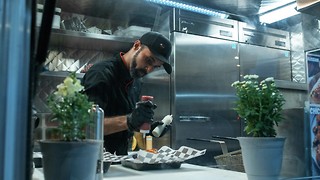Preview: The Vagina Monologues
Twenty years since its debut, The Vagina Monologues is as relevant as ever

As I walk into the Larkum studio, only Eva O’Flynn (Director) and Katurah Morrish (or Kat) are present. I interrupt them, and pleasantries are exchanged. I take a seat a little way from the door, facing Eva and adjacent to Kat, who is sitting with a copy of The Vagina Monologues in her hand. They’re in the middle of the monologue titled ‘The Flood’. I ask them to not mind me, and for the next 45 minutes, they don’t. I am lost in the background, much like the stacked chairs beside me.
Eva offers very specific and crisp suggestions to Kat, who quickly incorporates these into the next run of her speech. She is playing an elderly woman in this monologue, a character amalgamated from interviews with women aged 65-75, who’d never before had any interview where they talked about their vaginas. You get the feeling the word ‘poignant’ was created for works like ‘The Flood’.
This is a play that has attracted controversy in the past. I remember the Indian adaptation of the play being banned by the Chennai police in 2004 because it was considered a threat to public order (Jane Fonda and Marisa Tomei on stage at the same time must have been too much to handle).
The first thing I wanted to find out was how receptive to the play the Cambridge community has been. Eva tells me about her experience: “I think I've had one of two responses: either it’s been a slightly awkward laugh, kind of respectful but at the same time saying ‘don’t tell me any more about that’. Or saying, ‘Oh My God! Yeah, that’s so good!’ I think we’re really lucky that people are really excited about it.”

Kat adds: “Another thing that I've heard people say is like ‘ooh, The Vagina Monologues’ quite like, ‘oh, I know what’s that about… Oh, well, have a go then…’ I know it’s a big play, I know it’s been done.” Eva feels that the reaction to this play says a lot about Cambridge: “even though it’s known that it’s been done a lot of times and it’s so famous and the concept is largely well-known, it’s still seen as contentious”.
Eva also adds how at the end of their rehearsal last week, the cast played two truths and a lie, not about themselves but about their vaginas. “There were people in the cast at the beginning who would have done it but wouldn’t have been comfortable saying it. But now ... we were cracking up and it was so much fun”. They mention how there’s no space in dialogue or society where women can talk about their vaginas in the same way as they would being ill, for example, or about stories from their childhood.
I wondered how they felt about this 20-year-old play still being so relevant in Cambridge today. They tell me that it just goes to show that the work of the play – which is to make these stories heard – isn’t over yet. These raw and real monologues portray women as human beings, and that’s where its real charm lies.
If you’ve heard about The Vagina Monologues and know a friend who could benefit from having their mind expanded, bring them along. There’s a small chance they’ll never come to the theatre with you again, but there’s also the possibility that you’ve just increased the sum total of the world’s tolerance by just that little bit. And that’s always a good thing.
The Vagina Monologues is on from Thursday 24th to Saturday 26th November at the ADC Theatre
 News / Tompkins Table 2025: Trinity widens gap on Christ’s19 August 2025
News / Tompkins Table 2025: Trinity widens gap on Christ’s19 August 2025 News / Robinson historian calls to recognise first King of England4 September 2025
News / Robinson historian calls to recognise first King of England4 September 2025 Science / How to spot a cheater (without Coldplay’s kiss cam)5 September 2025
Science / How to spot a cheater (without Coldplay’s kiss cam)5 September 2025 News / Students form new left-wing society in criticism of CULC3 September 2025
News / Students form new left-wing society in criticism of CULC3 September 2025 Music / Video killed the radio star 6 September 2025
Music / Video killed the radio star 6 September 2025









